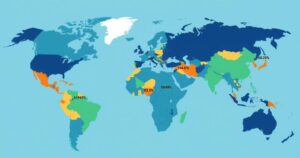Global Developments: Social Media, Stock Markets, Political Health, and Agriculture

This article discusses the reinstatement of the social media platform X in Brazil after a five-week ban, a sharp 7% decline in China’s stock market, Cameroonian President Paul Biya’s absence from public life amid health speculations, and Hungary’s increasing olive tree cultivation in response to climate change.
The social media platform X has been reinstated in Brazil after a five-week suspension due to its non-compliance with court orders regarding the removal of accounts spreading disinformation. Elon Musk, the owner of X, initially resisted these judicial orders, positioning himself as a champion of free speech. However, the substantial backlash from Brazil’s 40 million users, who began migrating to alternative platforms during the ban, compelled Musk to comply with regulations and resume service. In a significant financial update, mainland China’s benchmark stock index experienced a dramatic drop of 7% on a recent Tuesday, marking its largest single-day decline since February 2020, coinciding with the onset of the COVID-19 pandemic. Analysts attribute this fall, which halted a notable ten-day sequence of gains, to diminishing confidence in the efficacy of the Chinese government’s current economic stimulus measures aimed at revitalizing a sluggish economy. Amid speculation regarding his health, the Cameroonian government has affirmed the vitality of its 91-year-old President, Paul Biya, who has not been seen publicly for 32 days. Biya, who has maintained power since 1982, last appeared during a China-Africa summit in Beijing on September 8, missing several significant events, including the United Nations General Assembly. In a surprising agricultural development, Hungary is increasingly cultivating olive trees, defying prior assumptions that its climate was ill-suited for such crops. This change arises as climate conditions shift in Europe, pushing temperate zones northward. As a result, Hungarian olive oil has become a luxury item, with a mere tenth of a liter commanding a price of $12.35 in Slovenia, reflecting the rise of this product amid changing agricultural practices.
The recent return of X to Brazil follows a notable conflict between the platform’s policies and legal requirements, highlighting tensions associated with digital misinformation. In China, the rapid decline of stock indices signifies investor concerns regarding governmental economic interventions and the underlying health of the Chinese market. Cameroon’s situation regarding President Biya indicates potential political instability and health concerns surrounding long-term leadership. Meanwhile, Hungary’s initiative to embrace olive cultivation illustrates a broader trend of adaptation in agriculture due to climate change, revealing innovative responses to environmental shifts in Europe.
In summary, the reinstatement of X in Brazil reflects the dynamic interplay between free speech and regulatory compliance, while China’s stock market downturn signals growing anxiety about economic recovery efforts. The reaffirmation of President Biya’s health by the Cameroonian government addresses public concern over political leadership continuity, and Hungary’s foray into olive cultivation exemplifies adaptability in the face of climate evolution. Together, these developments underline significant sociopolitical and economic trends across various global contexts.
Original Source: www.gzeromedia.com








